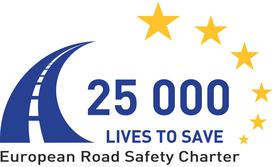AETR

- The European Road Safety Charter was created in January 2004. Each country's road safety decision-making authority is asked to commit to the charter. (Photo: www.autoettevoteteliit.ee)
The EU has negotiated agreements on behalf of the member states since the AETR case 22/70. In this "revolutionary" ruling, the EC Court in Luxembourg established the principle that the EU automatically has external negotiating competence where it is competent to establish internal rules. Put simply, internal competence = external competence.
Under the Treaty of Nice, the principle has developed so that decisions concerning international agreements are normally taken according to the voting procedures which apply in the area of internal decisions - i.e. (unanimity or qualified majority).
The future
The draft Constitution proposes giving the EU a single legal personality allowing it to negotiate internationally on behalf of the member states in all areas where the EU can act internally. This power ('competence') of external negotiation is supposed to be a so-called "exclusive competence" where the member states are not allowed to act unless they are authorised to do so by the EU's authorities.